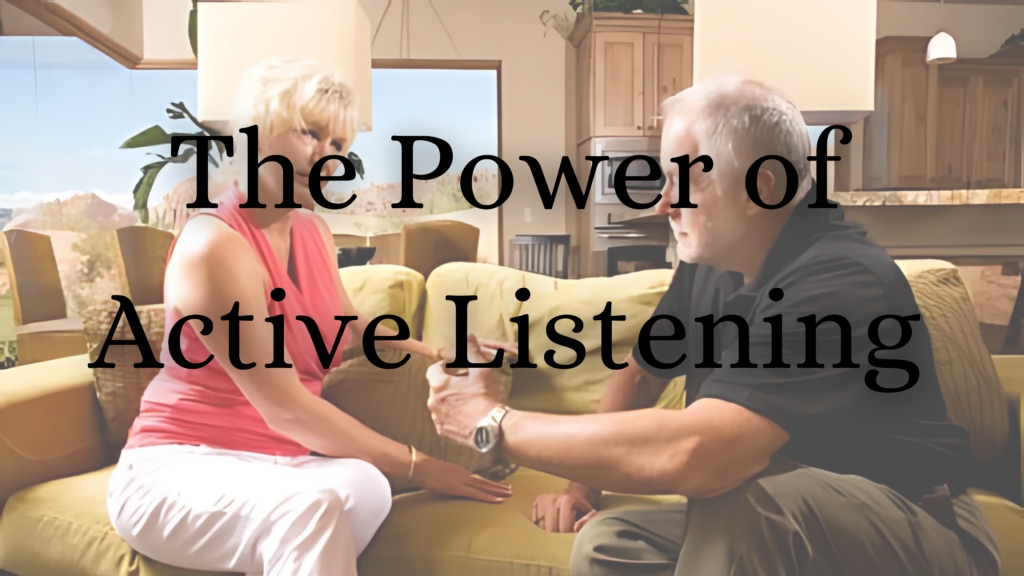The Power of Active Listening
Why Listening Matters
Communication is at the heart of every relationship, but real communication isn’t just about talking—it’s about listening. Active listening is the key to deep understanding, trust, and meaningful connections. The problem is, most of us listen just enough to formulate a response, rather than truly absorbing what the other person is saying. When we don’t listen effectively, we miss vital information, create misunderstandings, and erode emotional safety in our relationships.
What Is Active Listening?
Active listening is a skill that involves fully concentrating, understanding, responding, and remembering what is being said. It’s about being present in the conversation rather than thinking about what to say next. Here’s what active listening is not:
Waiting for your turn to speak rather than engaging with what the other person is saying.
Hearing words without absorbing their meaning.
Interrupting with advice or solutions before fully understanding the problem.
Getting defensive rather than trying to understand the other person’s perspective.
The Benefits of Active Listening
Mastering active listening can transform every relationship in your life. When you listen well you:
Build deeper trust because people feel valued and heard.
Reduce misunderstandings and unnecessary conflicts.
Improve your problem-solving skills by fully grasping situations before reacting.
Cultivate stronger connections by showing empathy and understanding.
Practical Steps to Becoming a Better Listener
Here are a few key techniques to practice active listening:
Give Your Full Attention
When someone is speaking to you, put away distractions. That means no scrolling on your phone, checking emails, or mentally rehearsing your response. Make eye contact, nod occasionally, and show you’re engaged.
Reflect Back What You Hear
A simple but powerful tool is paraphrasing what the other person has said to confirm you understand. For example:
- “So what you’re saying is, you felt overwhelmed by the workload and wished I had stepped in more?”
- “I hear that you’re feeling frustrated because you didn’t feel supported in that situation.”
Ask Open-Ended Questions
Encourage deeper conversations by asking open-ended questions rather than just yes/no ones. For instance:
- “How did that make you feel?”
- “What was the hardest part of that for you?”
- “Can you tell me more about what happened?”
Resist the Urge to Fix Everything
Sometimes, people just want to be heard—not immediately advised or problem-solved. Instead of jumping in with solutions, try saying:
- “That sounds really difficult. I can see why you’re upset.”
- “I understand why that would be frustrating.”
Pay Attention to Nonverbal Cues
Communication isn’t just about words—it’s also about tone, facial expressions, and body language. If someone says, “I’m fine,” but their body language says otherwise, tune in and respond with empathy.
Common Barriers to Active Listening
Even with the best intentions, certain habits can get in the way of truly listening. Some common barriers include:
- Distractions – Multi-tasking while trying to listen.
- Judgment – Forming opinions before fully hearing the other person.
- Emotional Reactivity – Getting defensive rather than seeking to understand.
- Mind-reading – Assuming you already know what the other person is going to say.
Final Thoughts: Making Active Listening a Daily Practice
Active listening isn’t something you perfect overnight—it’s an ongoing practice. The more you commit to it, the more you’ll see improvements in your relationships, whether at home, at work, or in friendships. Try incorporating just one or two of these techniques in your next conversation and notice the difference it makes.
💞If you would like support within your relationship from a community of likeminded individuals, why not join my free Facebook Community: Relationship Academy💞
Has there been infidelity in your relationship, read my blog on rebuilding trust here!

